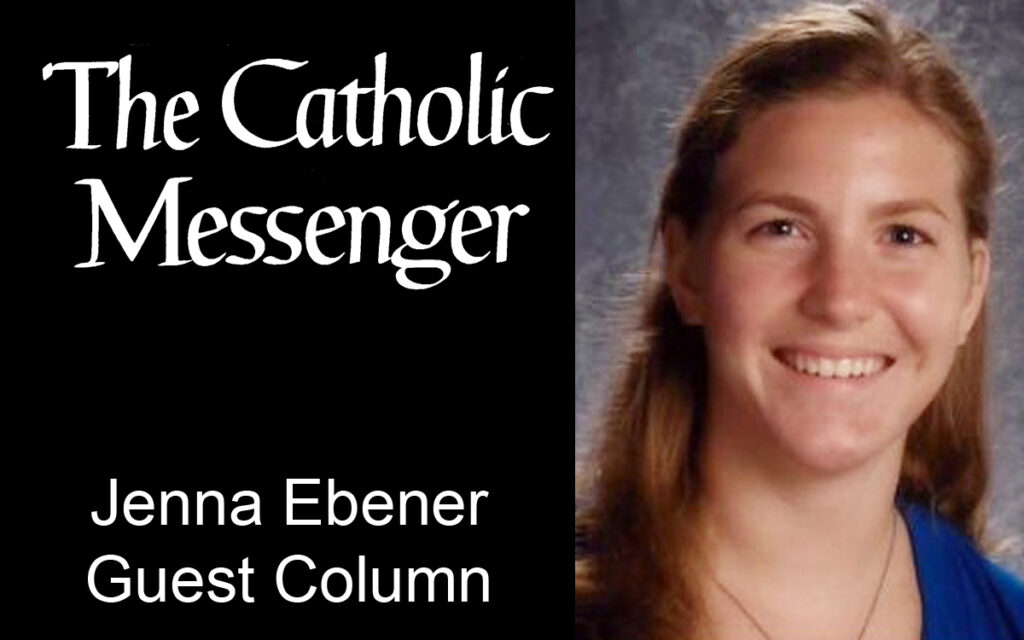By Jenna Ebener
There are many types of fear. There are fears of specific animals, people, places and activities; fear of the unknown and change; fear of what others think of us; and fear of pain, illness and death, to name a few. Some fears are due to past experiences, some are ingrained in us to keep us safe and others might not appear to have a rational explanation for their presence.
 I think the experience of Bethany Hamilton, as depicted in the movie “Soul Surfer,” gives us a good example of showing how we can experience multiple kinds of fear at the same time. When Bethany was 13 years old, she was attacked by a shark while surfing and lost an arm. After surviving that harrowing experience, she recognized she had to decide between two fears — the fear of getting back in the water versus the fear of losing a part of herself if she did not. She knew the fears of the ocean were nothing compared to the fear of not being true to herself. While we may not face such a traumatic experience, the trauma of fear is very real and prevalent. If we do not recognize fear for what it is, it can easily overtake us. I think the fear that often results after death is a great example.
I think the experience of Bethany Hamilton, as depicted in the movie “Soul Surfer,” gives us a good example of showing how we can experience multiple kinds of fear at the same time. When Bethany was 13 years old, she was attacked by a shark while surfing and lost an arm. After surviving that harrowing experience, she recognized she had to decide between two fears — the fear of getting back in the water versus the fear of losing a part of herself if she did not. She knew the fears of the ocean were nothing compared to the fear of not being true to herself. While we may not face such a traumatic experience, the trauma of fear is very real and prevalent. If we do not recognize fear for what it is, it can easily overtake us. I think the fear that often results after death is a great example.
Twice now, I have experienced a high number of deaths in a short time period. In 2019, our school had five students who were medically fragile die in seven weeks. Recently, two relatives and one student died within three weeks and another student died a few weeks earlier. I know my experience is not uncommon, especially over the past couple of years.
This high frequency of death, especially of children, uncovered in me a fear of suffering. I have been diving into this fear the past couple of years.
Deaths, especially unexpected deaths, cause many people to realize how quickly our time on earth can end. That realization can lead to a greater presence of the moment and appreciation for others. Adversely, it can also lead to fears of the suffering that accompanies death. Those fears might be manifested by disconnecting from others to try to lessen the blow of future pain or by dissociating from our emotions to attempt to escape the pain. When all of those students died, I fell into the latter category. I kept myself busy by focusing on how to help others through their pain while ignoring my own. The result led to a faster rate of burnout as well as disconnection from myself. I am still rediscovering the connection.
In this Easter season, Jesus presents us with beautiful reminders of the power of death. First, death unites us in our humanity as we come together to mourn and comfort each other. Jesus showed us the importance of this step when he grieved the death of Lazarus — “Jesus wept” (John 11:35).
Jesus did not raise Lazarus from the dead until he shared the emotion of that loss with Lazarus’ loved ones. Jesus then took it a step further by showing us the true power of our belief in him by resurrecting from the dead. We know that death is a necessary step for eternal life. While it hurts beyond comparison to part from those we love, the more connections we make on this earth, the greater the intensity of the joy that will come as we all celebrate together one day with our Heavenly Father. “For since death came through a man, the resurrection of the dead comes also through a man. For as in Adam all die, so in Christ all will be made alive” (1 Corinthians 15: 21-22).
(Jenna Ebener, a graduate of St. Ambrose University in Davenport, is a social worker at a school in Colorado for students with a combination of medical, cognitive and behavior disabilities. She relies on God every day to aid her on this wonderful, yet intense journey.)











